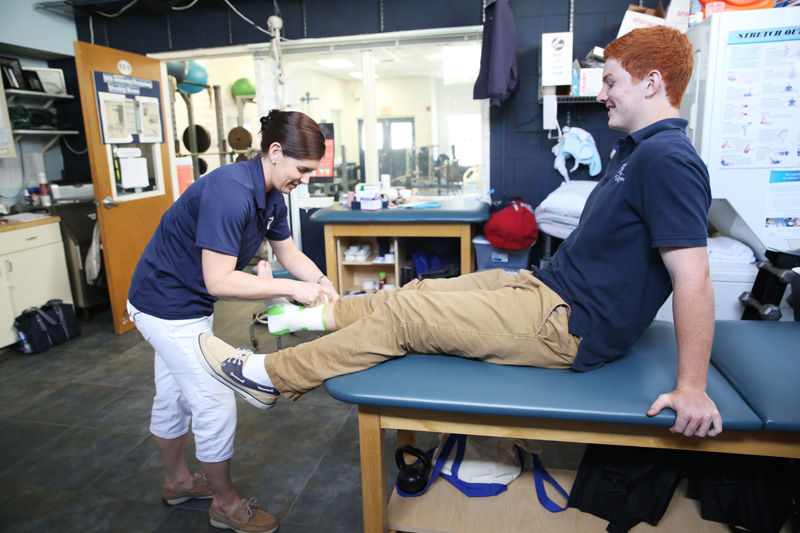Lisa Weiss is winding down her seven-year tenure as St. Ed’s Certified Athletic Trainer (ATC) to concentrate on pursuing a Doctor of Physical Therapy degree at the University of St. Augustine for Health Sciences. Her goal at this point is to graduate in 2017 and work in Pediatric Physical Therapy.
During her time at St. Ed’s, Weiss has been on the cutting edge of many developments in her field. In addition to tending to the nagging aches and pains experienced by the young athletes under her care, she has seen dramatic advances in the identification and treatment of head and spinal injuries.
Additionally, heat-related issues ranging from simple muscle cramping to life-threatening events are a concern for athletes of all ages in Florida, as was tragically highlighted by the 2014 death of 14 year old Sebastian River HS football player William Shogran Jr. due to heat stroke.
An athletic trainer must be able to recognize and respond appropriately to the entire spectrum of circumstances affecting the health and safety of those engaged in physical activities.
Every day on the job, Weiss routinely addressed topics like hydration, nutrition, lifestyle choices and academics. It was not uncommon for her to establish a foundation of trust and confidence with many of her student-athletes at St. Ed’s.
Nevertheless, at times there was an uphill battle to reverse an entrenched sports culture formulated over decades by athletes, coaches, administrators, and in some cases, parents.
“Having a full time ATC at high schools is essential,” Weiss explained. “On their own most kids will play through anything whether it is for their team, coaches, parents, or a personal goal. They do not want to let people down and will not speak up if something is wrong until they absolutely have to. Someone needs to be there to ensure their safety and future well-being, someone who can put the game aside and look out for their health.
“We are there to facilitate the prevention of injuries, treatment of injuries, and to monitor recovery so that athletes do not risk further complications by returning to play prematurely. The care given in the first few minutes of an injury is critical and can determine the long-term fate of an athlete. That type of decision is not something that players, coaches, administrators or parents should have to worry about. They are not trained to do so.”
Recently enormous strides have been made in the awareness and treatment for head trauma. Concussions are generally associated with contact sports like football, but no sport or physical exercise is entirely devoid of an impact of some sort, an errant elbow, or a whiplash fall to a hard surface.
“When I first came to St. Edward’s concussions were not really on anyone’s radar,” Weiss said. “I attended conferences every summer to learn more about the nature of concussions and how they should be treated in adolescents. Over the past seven years I have developed a concussion protocol that is updated annually in accordance with the latest research.
“We have also implemented a baseline program to test athletes for cognitive function before the sports season begins. We are getting a better idea of how concussions affect kids and when they should be allowed to return to practice or a game. As tedious as it can be to get everyone tested, this has been a valuable tool here and has put us ahead of other schools in concussion evaluation and treatment standards.”
Indeed at one particular football game last fall, at least a half dozen Pirate players were sidelined based on the concussion protocol.
“With all the recent media reports and research on concussions, parents are naturally worried about their kids playing contact sports,” Weiss told us. “Most athletes are obviously angry, and then sad, when withheld from competition. I hate to sit a kid out, but I try to explain that it is in their best interest.
“Once they take in what happened and better understand the healing process, they feel a little better and are more motivated to do their part to make the process go smoothly. My goal is to get them back on the field as quickly and safely as possible.”
Staying atop of developments in the science of head trauma was surely a signature achievement for Weiss at St. Ed’s. More often than not however, she could be found in the training room taping an ankle or advising a youngster on proper stretching. Then she would hop into her golf cart to monitor ongoing events on campus.
“Being an ATC at St. Edward’s has no doubt given me valuable experience in the field of orthopedics and sports medicine,” Weiss stated. “What I have learned from each and every athlete I have worked with, from traumatic to overuse injuries, has helped me in my chosen profession.
“One huge thing I take away is that everyone needs an individualized program for success in overcoming injury, illness, or any obstacle in life for that matter. I intend to carry this philosophy into my career as a physical therapist.”
Departing will not be easy. “I’ve called St. Edward’s my second home for seven years and spent the better part of my career here. I want to thank Jeff Lamscha, Mike Mersky, Bruce Wachter and Krissy Fojtik for the support, guidance and encouragement they have given me.
“Most importantly I want to thank the student-athletes I have come to know so well. I will miss being here every day and watching the growth and success of our talented multi-sport athletes. It’s been fun.
“Happy 50th Anniversity St. Edward’s School. And GO PIRATES!” she said in conclusion.

